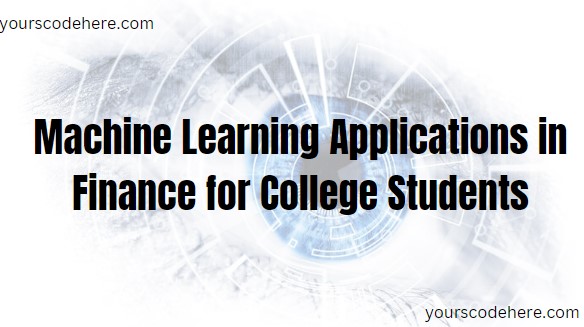For college students passionate about technology and finance, the integration of machine learning into financial systems offers an intriguing intersection. This guide provides an overview of machine learning applications in finance, offering insights into its transformative role in the industry.
1. Predictive Analytics in Investment:
a. Algorithmic Trading: Explore how ML algorithms analyze market data to predict trends, optimize trade execution, and identify profitable investment opportunities.
b. Portfolio Management: Understand how ML models aid in constructing and managing investment portfolios by optimizing asset allocation and risk management strategies.
2. Credit Scoring and Risk Assessment:
a. Credit Decision Making: Learn how ML algorithms assess creditworthiness by analyzing customer data, enabling more accurate lending decisions and risk assessment.
b. Fraud Detection: Explore ML’s role in fraud detection, identifying anomalies in transactions, and mitigating potential financial risks for banks and financial institutions.
3. Personalized Financial Services:
a. Robo-Advisors: Understand the concept of robo-advisors, automated investment platforms that use ML to offer personalized investment advice based on individual preferences and goals.
b. Customer Experience Enhancement: Explore how ML algorithms analyze customer behavior to personalize financial services, offering tailored products and services.
4. Risk Management and Compliance:
a. Market Risk Analysis: Delve into ML’s role in analyzing market fluctuations, modeling risk scenarios, and aiding in proactive risk management strategies.
b. Regulatory Compliance: Understand how ML systems assist in compliance by automating regulatory reporting, ensuring adherence to financial laws and regulations.
5. Challenges and Ethical Considerations:
a. Data Privacy: Explore concerns surrounding data privacy and security in handling sensitive financial information within ML systems.
b. Algorithm Bias: Discuss the potential biases in ML models and the importance of ethical considerations in developing fair and unbiased financial systems.
6. Learning Opportunities for Students:
a. Academic Programs and Courses: Explore universities offering courses in financial technology (FinTech) or machine learning applications in finance.
b. Internships and Projects: Seek internships or projects in financial institutions or FinTech startups to gain hands-on experience in applying ML to finance.
Conclusion: For college students intrigued by the convergence of technology and finance, delving into machine learning applications within the financial sector presents a vast landscape of opportunities. Understanding how ML revolutionizes investment, risk assessment, and customer-centric financial services provides a strong foundation for future professionals seeking innovation in the finance industry.










